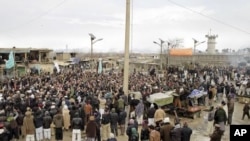Deadly protests over the burning of Muslim holy books at Bagram airbase, the main American military installation near Kabul, continued across Afghanistan Thursday, bringing the death toll to at least 13 over three days of unrest. Victims include two U.S. servicemen who were shot to death outside a coalition military base in Nangarhar province by an individual wearing an Afghan-army uniform during one of the many protests.
Omar Sharifi, a Kabul native and director of the city's office of the American Institute of Afghanistan Studies, says there is popular frustration with what many Afghans perceive as foreign forces flouting their laws and insulting their culture.
But he also says that most Afghans do not support the Taliban's calls to attack and kill foreign troops to avenge the burning of Qurans at the U.S.-run base.
"The Taliban themselves are not very popular, I have to emphasize on that issue," he says. "They themselves have a very blurry record of violating Islamic principles and targeting Muslims."
Sharifi says that while Quran-burning incidents raise the level of resentment against the foreign military presence in Afghanistan, most Afghans also believe the international community has played a constructive role in the country.
“These incidents happened in the past, but on other hand there is a lot of progress because of the international presence and international support," he says. "So I think there is a conscious understanding in Afghanistan to differentiate between these two things.”
Although the U.S. has apologized for the incident and called it a mistake, protesters in eastern Afghanistan threw rocks and tried to remove razor wire from the perimeter of an American military base while Afghan police used water cannons, batons and fired over the heads of demonstrators to disperse the crowds. Several protesters reportedly were killed and injured in the clashes.
Sharifi says the U.S. apology, followed by a legitimate and transparent investigation to ensure the incident was not intentional and will not be repeated, should satisfy the public's anger over time.
If handled correctly, he says, the issue should not affect talks between Afghanistan, the U.S. and NATO to reduce foreign troops in the country, nor undermine exploratory talks U.S. and Afghan governments plan to hold with the Taliban in coming months.
Burning of Qurans Puts Match to Fuming Resentments
- By Brian Padden





